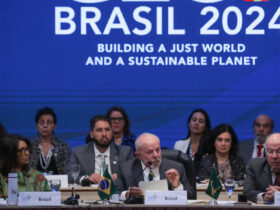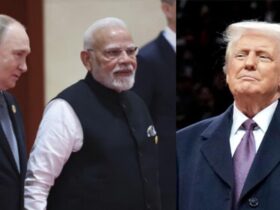Josef Mengele was a Nazi physician who conducted sadistic experiments on Jewish people at the Auschwitz death camp.
After the war ended, the so-called “Angel of Death”, who was becoming infamous for his murderous exploits in the name of science, managed to avoid capture in Germany and escaped to Argentina with the help of former fellow members of the SS – the Nazi regime’s elite protectorate.
It is the starting point of “The Disappearance of Josef Mengele”, a film drama detailing the war criminal’s successful efforts to avoid trial as he travels from Buenos Aires to Brazil via Paraguay.
Directed by Kirill Serebrennikov, a Russian filmmaker, theater director and critic of Vladimir Putin, the German-language film premiered at the Cannes Film Festival in May and is being released in theaters across Germany this week.
Based on the award-winning 2017 book by French journalist and author, Olivier Guez, the film is a bleak portrait of the roots – and consequences – of ideological extremism.
in search of justice
While Nazi architects of the genocide like Adolf Eichmann ultimately faced justice – and execution – thousands of other collaborators, German immigrants, fled to South America with the support of sympathizers – and in the case of Argentina, the help of President Juan Perón, an ally of European fascism.
“The Disappearance of Josef Mengele” begins in 1956 when a German war criminal under the name of Helmut Gregor is living in exile in Buenos Aires. But Israeli Secret Service (Mossad) agents, West German officials and Nazi hunters are on the lookout for him.
Starring August Diehl (“Inglourious Basterds”) in the title role, the film shows how money, connections, and a chameleon-like talent for disguise help one of the world’s most wanted men evade international justice for decades. Mengele ultimately died by drowning on a Brazilian beach in 1979 due to a stroke.
The film also explores how a man who conducted brutal eugenic experiments at Auschwitz can never escape his past. Mengele’s son Rolf, aged, alone, sick and living under a false identity in São Paulo, tracks him down and asks what happened in the death camps. Since a new generation is demanding the truth, Mengele can only spew the fascist lies he used to justify his crimes.
‘The path from an ordinary person to a criminal and a sadist’
“What happens to war criminals when the war is over? Is there such a thing as divine justice? Will these people eventually be held to account for their deeds?” These are the questions that inspired Kirill Serebrennikov to adapt Olivier Guez’s non-fiction novel exploring the nature of evil. “Karma, punishment, justice – all this has always interested me,” he said during an interview conducted by the film’s distributor.
The director, a critic of the Putin regime who spent years under house arrest in Russia, deliberately brings the audience closer to Mengele, allowing them to understand his dogmatic thinking. This approach was partly inspired by German-Jewish intellectual Hannah Arendt, whose concept of the “ordinariness of evil” – conceived in the wake of the trial of Adolf Eichmann – concluded that “monsters are no different from ordinary people,” said the Russian director.
He said, “The point is to ask the viewer to put on Mengele’s mask in order to understand that the path from normal person to criminal and sadist can be frighteningly short.” “In his mind, he does not see himself as the embodiment of evil at all. There were many other doctors at Auschwitz – why should he be blamed?”
The filmmakers insist that this point of view should never evoke sympathy. He said, “Sympathy for Mengele is impossible.”
Serebrennikov was also inspired by Jonathan Littell’s 2006 historical novel, “The Kindly Ones”, about a cultured SS officer living in comfort in post-war France who recounts his massacre on the Eastern Front.
In addition to its central protagonist, “The Disappearance of Josef Mengele” also focuses on the network of people across Europe and South America who protected, financed and hid Mengele until his death.
The director said, “Evil is not only Mengele, but also all these people.” “Many of them survived it.”
A cautionary tale of ideological extremism
Not being a German speaker, Serebrennikov said he had a lot to learn about how generations of Germans have come to terms with this history.
Currently living in Berlin, he interviewed actors, journalists, friends and producers to hear stories about his grandparents’ life before and after the war.
“Many people remained silent,” he said. “It’s a very painful subject. But maybe the film has the potential to spark a bigger debate. That would be good.”
As right-wing ideology reemerges across the broader global political spectrum, “The Disappearance of Josef Mengele” also aims to remind audiences of the dangers of dogmatism.
The film’s producer, Felix von Boehm, said, “At present we are strongly surrounded by ideological systems, and I hope that this film, in its accurate description of ideological narrow-mindedness, will help people stop getting trapped in any kind of ideology.”
Edited by: Brenda Haas






Leave a Reply